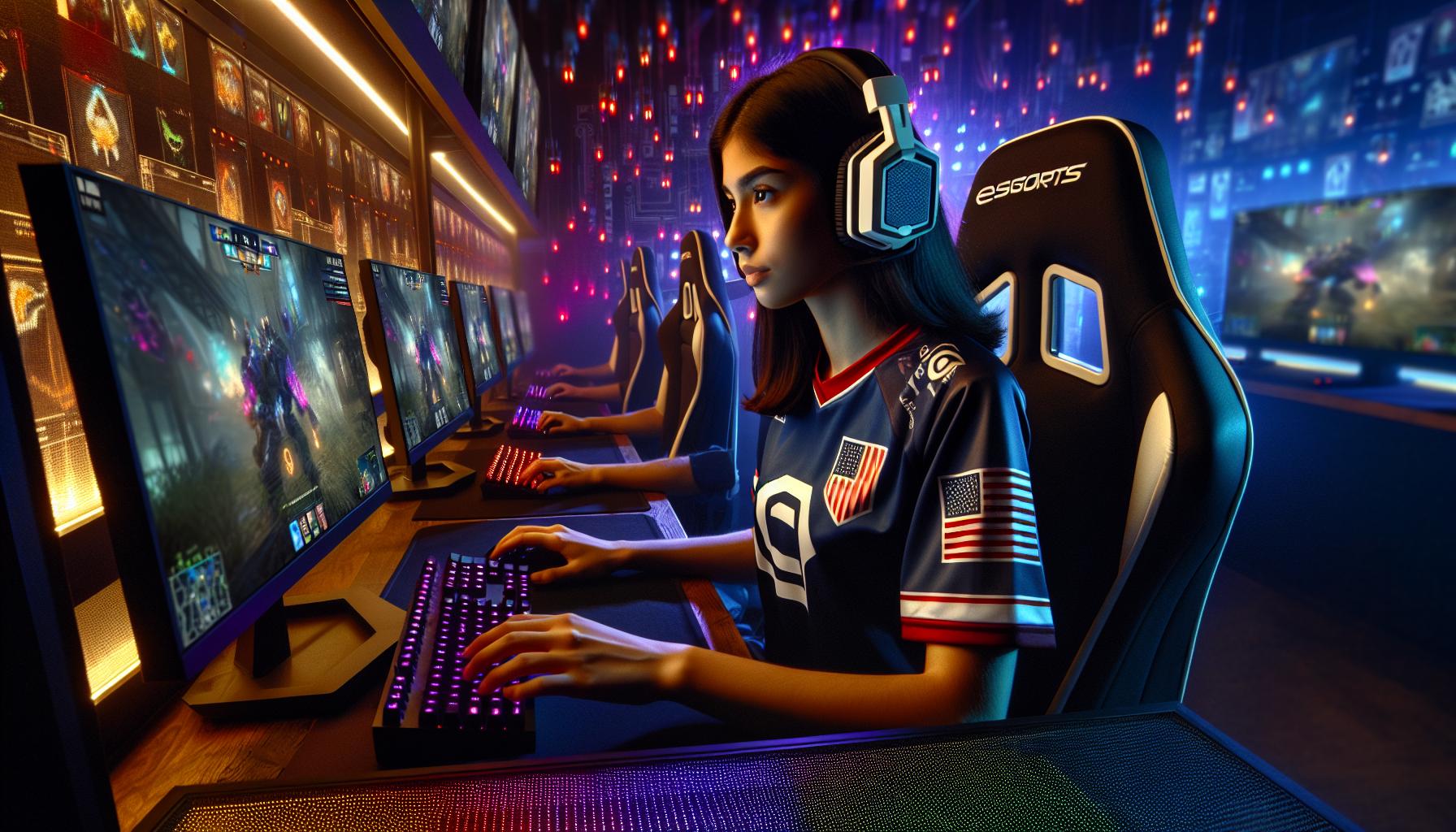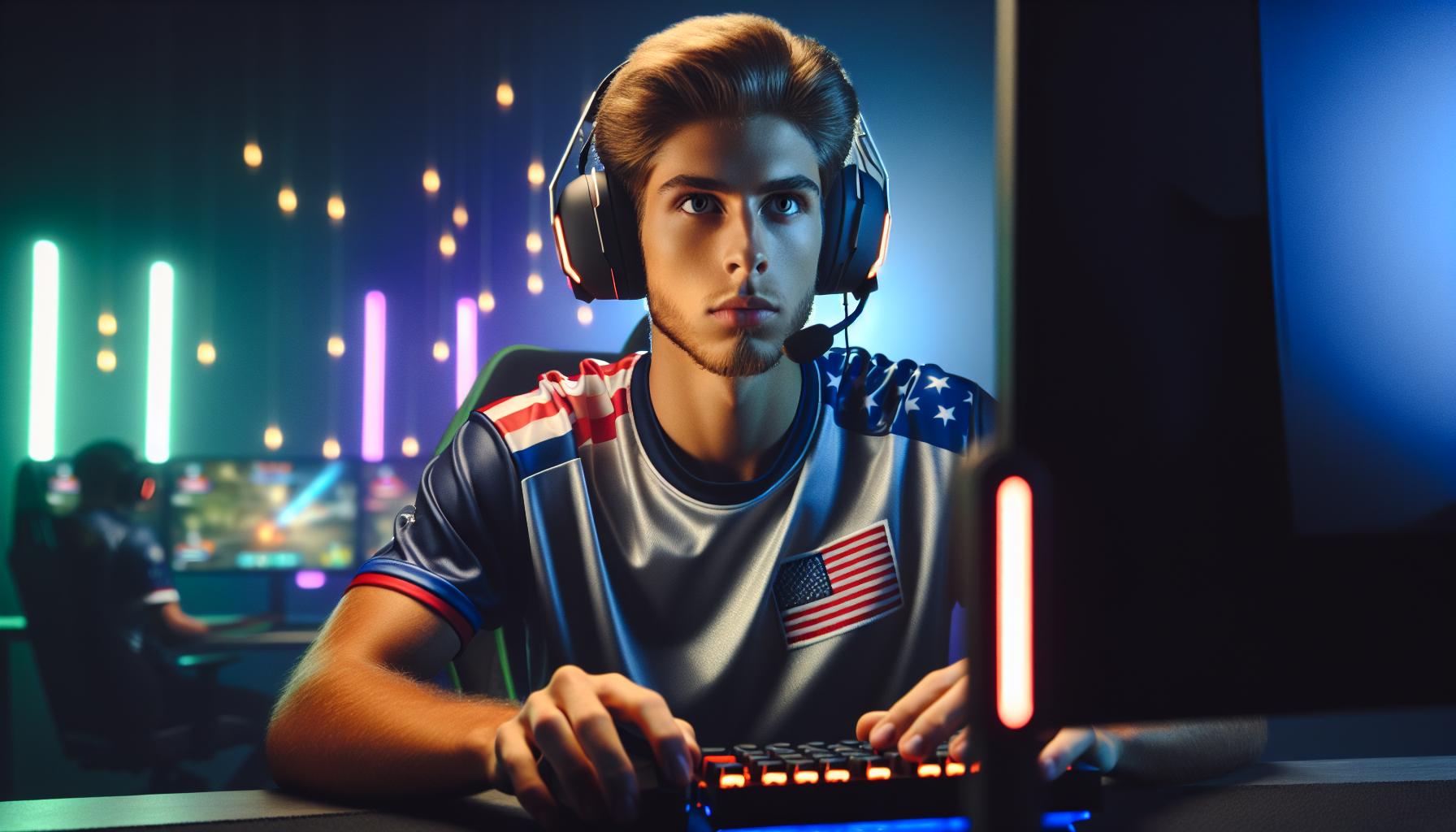Esports athletes are redefining the landscape of competitive sports, showcasing incredible skill and dedication. As the gaming industry surges in popularity, these players have emerged as icons, captivating audiences worldwide with their extraordinary talents. They train rigorously, often for hours each day, honing their reflexes and strategies to outsmart opponents in high-stakes tournaments.
The rise of esports has not only transformed how people view gaming but also created new opportunities for sponsorships, careers, and even scholarships. With millions tuning in to watch live streams and tournaments, esports athletes are carving out a unique niche that blends entertainment and competition. As they continue to break records and push boundaries, it’s clear that the world of esports is here to stay.
Key Takeaways
- Esports athletes are redefining competition: With remarkable skills and diverse backgrounds, esports athletes are seen as legitimate competitors in the sports industry, attracting substantial global attention.
- Rigorous training is essential: Esports athletes often dedicate 6 to 12 hours daily to practice, focusing on gameplay analysis, team scrimmages, and mechanical skill enhancement to maintain competitiveness.
- Growing career opportunities: The rise of esports has created various career paths through professional teams, sponsorships, and educational scholarships, reflecting the increasing recognition of esports as a viable career choice.
- Challenging misconceptions: The stigma surrounding gaming often leads to misunderstandings about the dedication and discipline of esports athletes, necessitating efforts to shift perceptions within both the gaming and sports communities.
- Importance of mental and physical health: Esports athletes face significant health challenges, including the risk of injuries and mental health issues; thus, implementing wellness programs and health management strategies is crucial.
- Promising future for esports: Advancements in technology, growing sponsorship investments, and the establishment of educational programs signal a bright future for esports athletes, further integrating them into the global sports landscape.
Esports Athletes
Esports athletes are competitive gamers who participate in organized, multiplayer video game competitions. These individuals possess exceptional skills, quick reflexes, and strategic thinking abilities. Esports athletes dedicate countless hours each week to practice and refine their gameplay, often mirroring the training regimens of traditional sports athletes.
Training for esports athletes includes participation in team scrimmages, analyzing gameplay footage, and developing communication skills. Effective teamwork plays a crucial role in achieving success in various esports titles, requiring athletes to work collaboratively to execute strategies in high-pressure situations.
Esports athletes come from diverse backgrounds and often specialize in specific game genres like first-person shooters, real-time strategy games, or multiplayer online battle arenas. This specialization allows players to hone their skills further, leading to improved performance in major tournaments.
The rise of esports has attracted significant sponsorship interests. Numerous companies invest in esports teams and individual players, enhancing their visibility and securing partnerships that provide financial support. Additionally, this financial backing facilitates the growth of esports ecosystems, promoting tournaments with larger prize pools and reaching wider audiences.
Scholarships for esports athletes are becoming more common in educational institutions. Colleges and universities offer esports programs, allowing talented gamers to further their education while competing at a high level. This trend underscores esports’ recognition as a legitimate sports field, providing athletes with opportunities beyond traditional career paths.
Overall, esports athletes significantly impact the gaming landscape, driving its popularity and shaping its future within the competitive sports arena.
Physical and Mental Demands

Esports athletes face rigorous physical and mental demands that parallel traditional athletes. Their training regimens focus on enhancing performance, while mental resilience is crucial for managing the pressures of competition.
Training Regimens
Training regimens for esports athletes involve structured practice and skill enhancement. Athletes train daily, typically for 6 to 12 hours, focusing on several key areas:
- Gameplay Analysis: Reviewing recorded matches to identify strengths and weaknesses.
- Team Scrimmages: Practicing with team members to develop strategies and communication.
- Mechanical Skills: Improving reaction times and precision through targeted exercises.
These elements ensure that athletes remain competitive in fast-paced environments, ultimately contributing to team cohesion and individual performance levels.
Mental Resilience
Mental resilience plays a vital role in esports success. Athletes encounter high-stress situations during tournaments that demand emotional control and focus. Several factors influence mental resilience:
- Stress Management: Techniques such as mindfulness and breathing exercises help maintain composure.
- Goal Setting: Establishing achievable objectives provides motivation and direction.
- Support Systems: Having coaches and teammates fosters an environment for emotional support.
Developing strong mental fortitude empowers athletes to perform under pressure, enhancing overall competitiveness in the esports arena.
Career Path and Opportunities

Esports athletes encounter diverse career paths and opportunities, significantly shaping their professional landscape. These athletes can find avenues in professional teams, sponsorships, and funding sources.
Professional Teams and Organizations
Professional teams form the backbone of the esports industry, providing structured environments for athletes. These organizations typically recruit players based on their skills and potential, often offering contracts that include salary, benefits, and performance incentives. Teams participate in various leagues, from local competitions to international tournaments, enabling athletes to showcase their talents on prominent stages. Renowned organizations like Team Liquid and FaZe Clan demonstrate the success possible in this field, offering resources for player development, coaching, and strategic planning. Additionally, players often collaborate with analysts and support staff, enhancing their gameplay and fostering a sense of community within their teams.
Sponsorship and Funding
Sponsorships represent a crucial revenue stream for esports athletes and teams, enhancing financial stability. Companies across industries, including technology, energy drinks, and apparel, invest in esports to reach expanding audiences. Sponsorship deals often include product endorsements, branding on uniforms, and promotional events, providing significant financial support. The evolving landscape has led to increased investment in grassroots programs, encouraging talent development from a young age. As esports continues to gain popularity, the competitive nature of obtaining sponsorships has intensified, motivating athletes to build personal brands on social media platforms, further amplifying their visibility and marketability.
Challenges Faced by Esports Athletes

Esports athletes encounter various challenges that can impact their performance and overall well-being. Two significant issues are stigma and misunderstanding, as well as health concerns.
Stigma and Misunderstanding
Stigma surrounding esports persists, often resulting in misconceptions about the athletes’ dedication and abilities. Many individuals equate gaming with laziness or a lack of discipline, overlooking the extensive training that esports athletes commit to. The rigorous practice schedules of 6 to 12 hours daily demonstrate their dedication and focus. Embracing these athletes as legitimate competitors remains essential for fostering greater respect within the broader sports community. Positive representation in media and increased visibility of esports as a professional discipline can gradually change perceptions, highlighting the true nature of competitive gaming.
Health Concerns
Health concerns remain a critical challenge for esports athletes, as their intense training regimens can lead to physical and mental stress. Long hours of gameplay increase the risk of repetitive strain injuries, such as carpal tunnel syndrome and tendinitis. Mental health issues, including anxiety and burnout, also affect many players, given the pressures of competition and the need for constant performance improvement. Implementing effective health management strategies, such as regular exercise, proper ergonomics, and mental health support, is vital. Organizations increasingly prioritize holistic well-being by providing access to sports psychologists and physical therapists, ensuring that athletes can maintain peak performance while protecting their health.
The Future of Esports Athletes
The future of esports athletes appears promising, driven by technological advancements and expanding industry recognition. Growth in virtual reality (VR), augmented reality (AR), and artificial intelligence (AI) enhances the training environments for these athletes. These technologies provide immersive experiences that refine skills and enable real-time feedback, ultimately boosting performance.
Sponsorship trends indicate increasing investment in esports. Major brands recognize the potential market reach and are forging partnerships with professional teams and individual players. This trend promotes overall financial stability, granting athletes access to better training facilities and resources. Financial support from sponsors aids in organizing larger events, which attract wider audiences and increased viewership.
Education will continue to evolve, with educational institutions developing esports programs. These programs often offer scholarships, emphasizing gaming as a viable career path. As a result, more students engage in competitive gaming while completing their education. Institutions are adopting comprehensive programs that include training, mentorship, and academic support.
Diversity within esports provides further growth opportunities. Representation of various gaming genres fosters inclusivity, allowing individuals with different skills to shine. Community-driven initiatives create safe spaces for athletes, nurturing talent and promoting mental well-being among participants.
Health management practices are gaining traction. Comprehensive wellness programs now emphasize physical conditioning and mental health support. Healthcare professionals, including sports psychologists and nutritionists, collaborate with esports teams to maintain athletes’ overall health and enhance performance.
As esports continues to solidify its position in the global sports landscape, increased recognition is inevitable. Competitive gaming will gain the same respect as traditional sports. More media outlets cover esports events, further solidifying professional gamers’ status and contributing to a broader cultural acceptance.
Continued growth in esports ensures that future athletes will face new challenges and opportunities. Enhanced training methodologies, financial support systems, and health management strategies will shape how these athletes compete and thrive in the competitive gaming arena.
Future Looks Promising For Esports Athletes
Esports athletes are carving out a significant niche in the competitive sports arena. Their dedication and rigorous training parallel that of traditional athletes, showcasing their commitment to excellence. As the industry continues to grow, so do the opportunities for sponsorships and scholarships, enhancing the visibility of these players.
The challenges they face, from stigma to health concerns, highlight the need for better representation and support systems. With advancements in technology and evolving educational programs, the future looks promising for esports athletes. Their journey is a testament to the legitimacy of esports as a career, paving the way for recognition and respect in the broader sports community.
